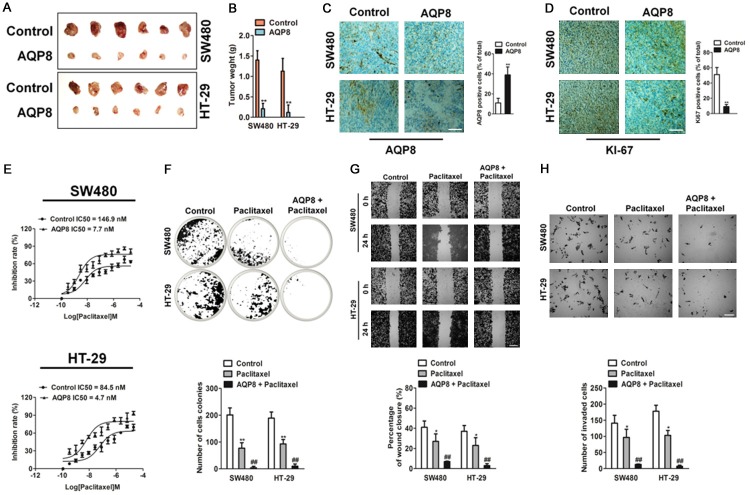Figure 6.
Over-expression of AQP8 inhibits colon cancer cells growth in vivo and confers sensitivity to paclitaxel. A. AQP8 overexpression inhibited tumor growth in vivo. Tumor pictures from mice inoculated with stable AQP8 overexpression CRC cell lines. Growth curve of tumor volume measured on indicated days. B. Tumor weight at the end of experiment. C. Photographs exhibited the IHC staining for AQP8 in tumors (left panel). Number of AQP8 positive cells in control and AQP8 stable expression tumors (right panel). Scale bar: 200 μm. D. Photographs exhibited the IHC staining for Ki-67 in tumors. Number of Ki-67 positive cells in control and AQP8 stable expression tumors (right panel). Scale bar: 200 μm. **P < 0.01 compared to control. E. In vitro paclitaxel-induced cytotoxicity assay using AQP8 over-expression colon cancer cells. Cells were cultured in the presence of paclitaxel for indicated time and followed by MTT assay. IC50 value was calculated. F. Cells were cultured in the presence of paclitaxel and colony formation was analysis. G. Wound healing assay was conducted using indicated cells treated with paclitaxel (50 nM). Scale bar: 200 μm. H. Boyden chamber Matrigel invasion assay using indicated cells treated with paclitaxel (50 nM). Scale bar: 200 μm. *P < 0.01 compared to control cells, **P < 0.01 compared to control cells, ##P < 0.01 compared to control cells treated with paclitaxel alone.

